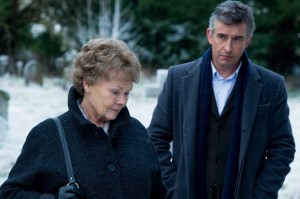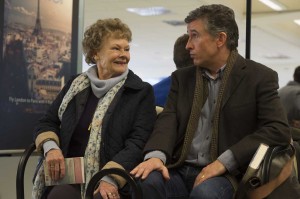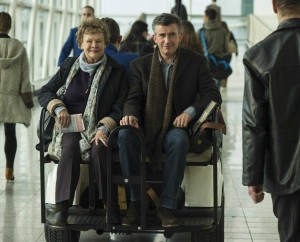
 With Coogan as Sixsmith, a central character in a film about his writing of the book on which it is itself based, there is a rather enjoyable layer of modest self-reference and an interesting depiction of the tribulations of the real Sixsmith, (whose travails will be a reasonably recent memory to many British viewers). Dame Judi Dench plays Philomena Lee, a woman sent to a Catholic convent in the 1950s and either asked, or forced, depending on your interpretation, to give up her child for adoption. While this might have led to the sort of all-out assault on the somewhat checkered history of the Catholic church represented by a film such as The Magdalene Sisters, Frears considers that approach “too easy. I thought we were quite gentle,” and the film avoids the recently-emerged genre that’s sometimes called “misery-lit.” Ultimately, flashbacks to the 1960s convent experience are brief. For all its touching scenes depicting loss and hope, the film mainly depicts a search, and any negative reaction from the religious lobby could be reasonably be characterized as a complaint too much. It is, after all, a true story, albeit one which initially drew an unanticipated rating from the MPAA for what Frears describes as “two and a half” uses of foul language, the distinction being in the Irish accent used by Dench as Philomena. Coogan went before the committee and persuaded them otherwise based on a reference to The Social Network, which had been granted a less restrictive rating despite more frequent uses of the same word “which is what makes it acceptable, apparently.”
With Coogan as Sixsmith, a central character in a film about his writing of the book on which it is itself based, there is a rather enjoyable layer of modest self-reference and an interesting depiction of the tribulations of the real Sixsmith, (whose travails will be a reasonably recent memory to many British viewers). Dame Judi Dench plays Philomena Lee, a woman sent to a Catholic convent in the 1950s and either asked, or forced, depending on your interpretation, to give up her child for adoption. While this might have led to the sort of all-out assault on the somewhat checkered history of the Catholic church represented by a film such as The Magdalene Sisters, Frears considers that approach “too easy. I thought we were quite gentle,” and the film avoids the recently-emerged genre that’s sometimes called “misery-lit.” Ultimately, flashbacks to the 1960s convent experience are brief. For all its touching scenes depicting loss and hope, the film mainly depicts a search, and any negative reaction from the religious lobby could be reasonably be characterized as a complaint too much. It is, after all, a true story, albeit one which initially drew an unanticipated rating from the MPAA for what Frears describes as “two and a half” uses of foul language, the distinction being in the Irish accent used by Dench as Philomena. Coogan went before the committee and persuaded them otherwise based on a reference to The Social Network, which had been granted a less restrictive rating despite more frequent uses of the same word “which is what makes it acceptable, apparently.”
 Philomena was shot in “eight or nine weeks” by cinematographer Robbie Ryan on the ARRI Alexa, Frears’ second outing on the camera system, with some flashback and pseudo-archival material shot on super-16 and super-8. Although the filmmakers also used real historical home movie footage of Philomena’s actual son, the mock historical footage raises a few nostalgic smiles, with the young boy descending the steps from an aircraft hand-in-hand with a stewardess in perfect Pan-Am uniform. Frears is quick to credit touches like this to his crew (costumes were designed by Consolata Boyle, a previous collaborator on The Queen, Tamara Drewe and productions stretching back to The Van in 1996).
Philomena was shot in “eight or nine weeks” by cinematographer Robbie Ryan on the ARRI Alexa, Frears’ second outing on the camera system, with some flashback and pseudo-archival material shot on super-16 and super-8. Although the filmmakers also used real historical home movie footage of Philomena’s actual son, the mock historical footage raises a few nostalgic smiles, with the young boy descending the steps from an aircraft hand-in-hand with a stewardess in perfect Pan-Am uniform. Frears is quick to credit touches like this to his crew (costumes were designed by Consolata Boyle, a previous collaborator on The Queen, Tamara Drewe and productions stretching back to The Van in 1996).
Regarding the edit, Frears said “the film didn’t work for a long time.” An original intention to open the piece with the story of Philomena, as opposed to that of Sixsmith, was “a big breakthrough,” and arguably makes for an easier opening to an audience perhaps more likely to identify personally with a frustrated, world-weary journalist. The unmistakable denouement of the piece, in which Coogan’s character directly – and finally – confronts an aging but culpable nun, was tweaked during a couple of days’ pickups to allow Dench’s character more knowledge of the situation she’s about to enter. Intentions for the end of the film were suggested by a frosty morning which required no enhancement to create the slightly mystical atmosphere seen in the final few exteriors. As a production in which overtly stylized photography would “have been inappropriate,” as the director puts it, this sort of visual subtlety stands out.
Regardless of any of this, Philomena has enjoyed considerable success on its release by The Weinstein Company, with five awards at the Venice Film Festival. Now working on the untitled Lance Armstrong biopic he finished directing just a couple of weeks ago in Texas, Frears considers his collaboration with Judi Dench the “main working relationship” of his career, which rather raises the promising question of what they might do next.





